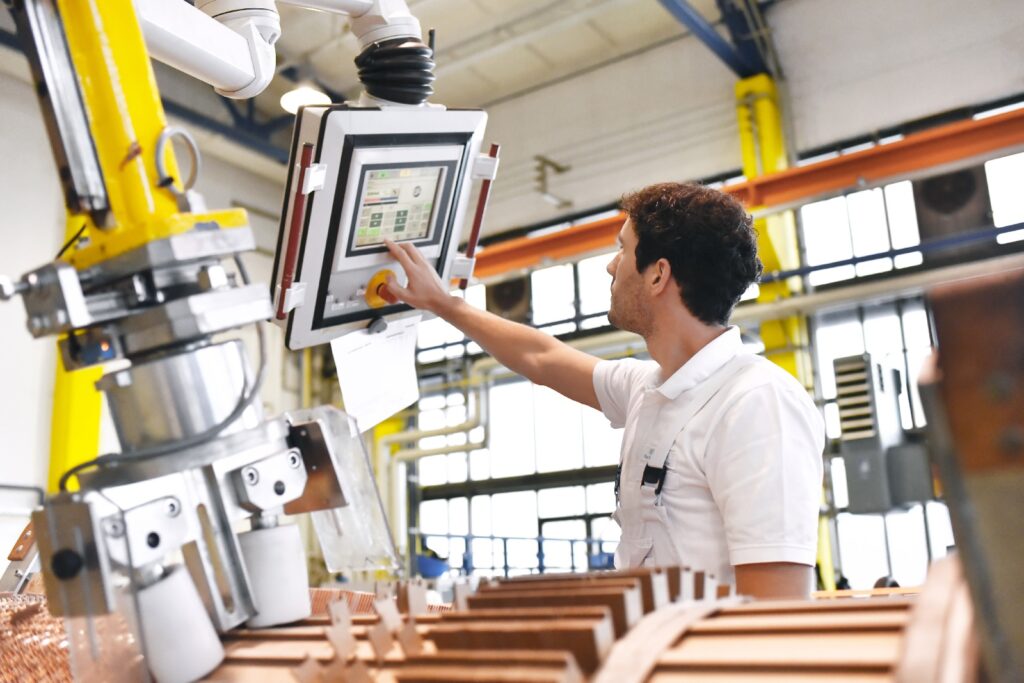Manufacturing Global HR Trends Report – 2023 EDITION
The deep transformation
of the Manufacturing sector
Manufacturing Global HR Trends Research
– 2023 EDITION
The deep transformation
of the Manufacturing sector

Manufacturing is regarded as the backbone of both social and economic development. Even as Covid-19 hit every industry in unforeseen ways, manufacturing has continued to contribute to the overall growth and competitiveness of countries, accounting for 17% of the global Gross Domestic Product (GDP) in 2021.
Of course, other world events have shaped the industry – political unrest and conflicts around the globe have continued to create insecurity in the business community. Manufacturing, however, remains truly relevant for economic systems. In fact, the global manufacturing market was worth $16.4 trillion in 2021. But while analysts and researchers have a solid bird’s-eye view of manufacturing, it is really those working in the industry who can provide a nuanced view into the state of manufacturing today and where it is headed in the future.
We interviewed 240 manufacturing experts, from HR managers to plant and production managers, to uncover informed insights on challenges, opportunities, and trends within the sector
- Learn what trends will be shaping the industry in 2023 and beyond
- Identify potential difficulties and how to overcome them
- Understand how to maximize the efficacy of workforce
Flip the pages to see the Report preview below
Manufacturing Market Sees Substantial New Growth
Covid-19 hit the manufacturing industry fast and hard. As the pandemic peaked, suddenly the industry faced a shortage of workers and candidates, especially as quarantines required workers to stay at home and socially distance. In parallel, raw materials suppliers were impacted just as much, leading to breakdowns in supply chains and devastating shortages.
While some companies are still feeling these impacts, all told, the global manufacturing industry is seeing substantial growth. This growth is welcomed by those who understand that the industry’s development remains optimistic –so long as they understand the trends and how to adapt to them.
in finding specialised workers
New Global Trends Shape Future Development
Two major trends that are impacting every single industry are sustainability and technological advancements. Manufacturing is, of course, one of these industries needing to understand and adjust accordingly.
From the tech side, an increased focus on automation means that manufacturing companies are investing more in production management software and robotic tools. Successful manufacturers are using these as ways to improve assembly, inspection, inventory management, and production planning. Experts believe new technologies will increase productivity and efficiency, but will also present some difficulties, such as a lack of operator skills.
There is also a growing interest in sustainability that cannot be ignored. Sustainability is a top concern for consumers today, and this is having a significant effect on businesses today. Manufacturers are now gearing production toward sustainability – in fact, a reverse of former trends. As much as the world is working toward carbon-neutral goals, manufacturing is an industry in last place behind others.

Technology is Priority for Most Manufacturers
Digital transformation is now a priority for most manufacturers. Companies have access to a wide range of technologies to automate tasks, with the majority having already implemented digital solutions. The most common of these are cloud computing and digital integration, followed by Big Data and cybersecurity.
The prioritization of digital transformation varies by country to country; however, at the end of the day, experts believe that new technologies will increase productivity and efficiency. Yet, while it is clear that the manufacturing industry sees the appeal in technological innovation, it is not without its challenges – particularly for those technologies that are not yet refined. Still, as a response to Covid-19, it seems many companies have invested in these efficiency-offering technologies and presumably are willing to tolerate any teething problems in the interest if long-term gains. The big question is: how do they prepare their workforces for these hufe institutional changes?
Automation Will Directly Impact the Manufacturing Workforce
Many workers in many industries have perceived a technology as a threat to their jobs – and rightfully so. The good news is that in recent years, professionals in manufacturing have undergone a mindset shift around this topic and have even found automation as an opportunity to create jobs. Industry leaders expect automation to increase productivity, raise efficiency, and make their companies more competitive.
The change in the approach toward automation in manufacturing dovetails with the advancement of automation overall, especially as predicted market value of the sector continues to climb. Again, this attitude varies by country, but at the end of the day, automation and new technologies are here to stay. How can manufacturing companies adapt to this? The answer lies in ensuring workers have the correct skills necessary to do their jobs. As over one-third of experts say many workers do not have the right sakills to succeed at new jobs
What will be the impact of business automation and digitization processes on employment?
43% the employment will increase
25% the employment will decrease
30% No impact at all
2% I don’t know
Receive your report
Want to learn more about the challenges, opportunities and trends of the Manufacturing sector? Download the free report.
Find out more about our Research.
This rigorous study, conducted by Gi Group Holding in collaboration with Istituto Piepoli and INTWG Data Management, features:
- Updated public data about the manufacturing industry.
- Exclusive insights from 270 manufacturing decision makers from 6
- Growth and innovation
- Automation and employment
- Labour market
- Training and recruitment
- Image of the Manufacturing industry








